Joan D. Vinge’s “Eyes of Amber” is (at time of writing) the latest Hugo finalist featured as part of my series Young People Read Old SFF. Many of the Young People liked the way a story that initially seemed high fantasy turned out to be science fiction.1 Readers (at least those who didn’t look at any of the covers for the various editions of Eyes of Amber, which always give the game away) could well believe they were reading a purely fantastic tale set in some secondary fantasy universe, rather than one set on Titan (as understood before the latest data collected by Voyager).
While Vinge’s story is arguably one of the finest examples of that particular sleight of hand2 (which explains the Hugo she won for it3), Vinge is not the only author to deploy this strategy. Consider these five other works.
Lord of Light by Roger Zelazny (1967)
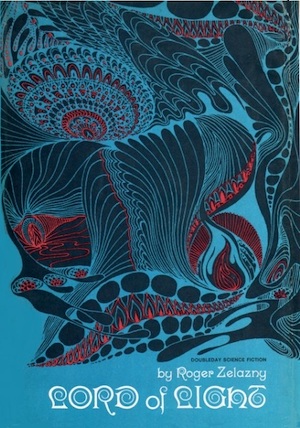
This LBJ-era science fiction story appears at first to be a South Asian fantasy world as imagined by a chain-smoking American science fiction author. Almost true…but at the same time, very wrong. In fact, the world on which Lord of Light is set is an alien planet, a planet settled ages ago by the Star of India. Armed with advanced technology and stupendous psychic powers4, the crew first stole the planet from its original inhabitants, then set themselves up as the ruling class over the colonist-class settlers. To discourage rebellion, the crew have been cosplaying Indian gods ever since. They have applied a high fantasy patina to an oppressive SF reality.
The flaw in this grand fraud? Even a god might object to injustice and even dictatorial gods may not triumph over a sufficiently cunning social justice warrior.
Enchantress From the Stars by Sylvia Engdahl (1970)
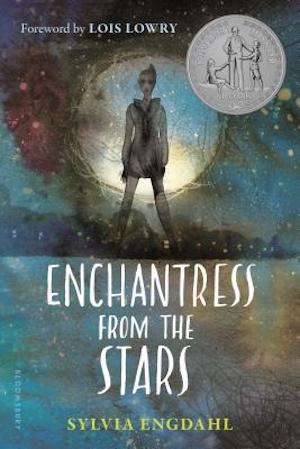
As far as humble woodcutter Georyn is concerned, the rampaging beast terrorizing his village is a dragon, a fell creature against which mortal weapons must fail. While the situation is just as perilous as it appears to be, the fact of the matter is the seeming dragon is just a machine, one of the tools that the starfaring Empire will use to conquer Georyn’s undeveloped world, Andrecia. Armed as its people are with medieval-level technology, Andrecia’s natives are doomed. Or so it seems.
Unbeknownst to the Empire, there’s another polity out there, the Federation. It’s more technologically advanced and has what we would regard as a superior moral code: Don’t conquer less advanced cultures; don’t even interfere in their affairs. The Federation sees the doom threatening Andrecia and looks for a loophole that might allow it to help the Andrecians.
Loophole: the Federation sends a teenaged agent, Elana, to Andrecia, there to pose as an enchantress. She is to wake Georyn’s psychic potential5 by her supposed magic. The woodcutter, given awesome psychic powers, can repel the Empire. Or so it is hoped.
“The Org’s Egg” by Frederik Pohl and Jack Williamson (1974)
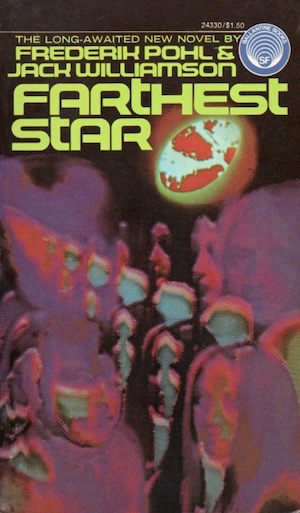
Fifteenth has all the accoutrements of a sword-and-sorcery protagonist (armor, sword, etc.). He even has a quest; if he succeeds, he will outrank some of the fourteen older men in his clan. But while his personal armament would be familiar to Conan, the winged harness that allows seven-foot-tall Fifteenth to soar through the skies of his world might surprise the Cimmerian.
All is explained to the reader in short order: the setting isn’t a high fantasy world but the low-gravity, high air-pressure exterior of a Dyson Sphere. The org whose egg Fifteenth seeks is not a dragon-by-another-name but an alien beast. Fifteenth is the descendant of primitive humans kidnapped by the Dyson Sphere’s hidden masters, who may not be elf lord and ladies, but who are just as tricksy and dangerous.
The Steerswoman by Rosemary Kirstein (1989)
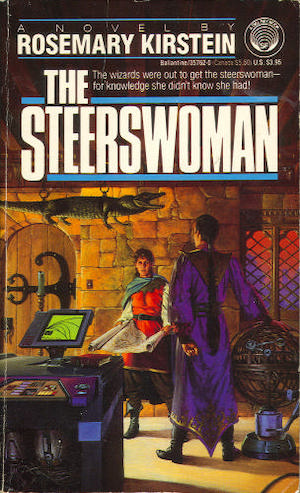
As in a thousand fantasy stories, two strangers meet in a tavern. One is Bel the Outskirter, a barbarian warrior. The other is Rowan, a Steerswoman. Steerswomen are a guild of explorers and archivists who have committed to answer truthfully any questions (provided that the asker truthfully answers Rowan’s questions in turn).
Rowan is as prudent as she is curious. She hires Bel to serve as her bodyguard while she investigates an odd fact: strange gems have been found scattered across their world, as though by some absurdly violent event.
It’s just as well that Rowan has a bodyguard, as she has inadvertently vexed the wizards who rule her world. If it weren’t for Bel she would be dead.
Wizards. Fantasy. Except… as the narrative slowly reveals, this is no fantasy world.6 The wizards don’t command any magic; their power comes from advanced technology. Their grudge against Rowan is that her scientific insights make her all too likely to discover facts that the wizards very much want kept secret.
The Sorcerer of the Wildeeps by Kai Ashante Wilson (2015)
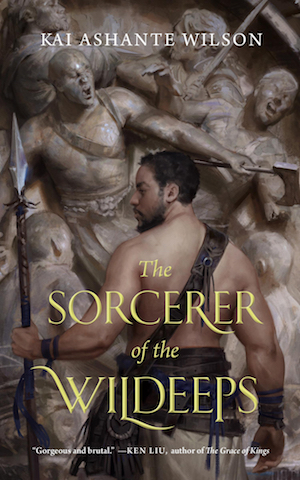
The gods are long gone but their demigod descendants are incapable of following them to…wherever. The demigods are forced to live among mundane humankind.
The Captain uses his semi-divine gifts to command a company of mercenaries. Demane serves the Captain loyally. This is not because both men are demigods, but because Demane is hopelessly infatuated with the Captain. The other soldiers don’t trust Demane, though perhaps they should. The talents of both demigods will be needed if the troupe is to survive passage through the Wildeeps.
While the setting at first seems fantastic, we eventually learn that the gods wielded advanced technology rather than magic. Their abandoned descendants are the beneficiaries of their tech.
***
These are, of course, only a few of the works I could have cited. No doubt you have your own favorites, stories you expected but did not see above. Comments are, as ever, below.
In the words of fanfiction author Musty181, prolific book reviewer and perennial Darwin Award nominee James Davis Nicoll “looks like a default mii with glasses.” His work has appeared in Publishers Weekly and Romantic Times as well as on his own websites, James Nicoll Reviews (where he is assisted by editor Karen Lofstrom and web person Adrienne L. Travis) and the 2021 and 2022 Aurora Award finalist Young People Read Old SFF (where he is assisted by web person Adrienne L. Travis). He is a four-time finalist for the Best Fan Writer Hugo Award, and is surprisingly flammable.
[1]Wait, you say, how does one tell science fiction from fantasy? What’s the essential difference? It’s very simple: SF has a rocket-ship-and-atom label on the spine, whereas fantasy has a unicorn sticker.
[2]Randall Garrett played with the mirror image of the really-it’s-SF trope in his story “Despoilers of the Golden Empire,” which presents a purely mundane historical event in SFnal terms.
[3]Despite the Hugo win, “Eyes of Amber” is now out of print. However Vinge’s collection “Eyes of Amber and Other Stories” is widely available used. The story can also be found in the fourth volume of Asimov’s “Hugo Winners” anthology series. Also out of print—but some of my readers are likely to have all four volumes on their bookshelves.
[4]For reasons I won’t go into, psychic powers got grandfathered into SF.
[5]See footnote 4.
[6]The truth about the wizards was supposed to be revealed gradually. The US edition of the book, Del Rey, features a cover that was a gigantic spoiler; the UK edition had a fantasy cover: https://www.rosemarykirstein.com/tag/richard-hescox/










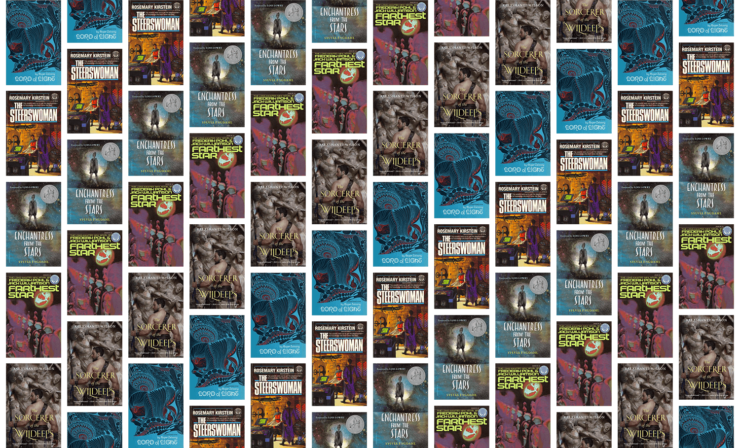
Don’t leave out:
The Roaring Trumpet by DeCamp and Stasheff (first of thousands of Harold Shea stories) where by shouting incorrect logic equations he inserts himself into Norse myth just before Ragnarok.
Creatures of Light and Darkness (Egyptian mythology) by Zelazny
The Queen of Air and Darkness (Celtic mythology) by Poul Anderson
Captive Universe (Aztec mythology) by Harry Harrison
Pern for me is probably the most obvious, but to me a more unsung version is Sharon Shinn’s Archangel series (which, sadly, the back cover blurb totally spoils the twist, haha).
Obvious addition: The Shadow of the Torturer, by Gene Wolfe.
Also, Moon-Flash, by Patricia McKillip.
(and many more …)
Great topic, continuing the trend!
Probably worth acknowledging that many of these stories were influenced directly or not by Arthur C. Clarke’s dictum:
Charles Stross’s Merchant Princes series starts out as urban fantasy, because at the time his publishing contracts didn’t allow him to write a scifi book. IIRC the contract situation was fixed quite quickly and some of the more SF’nal elements of the story could emerge. It’s not until the followup trilogy, Empire Games that it goes totally scifi (I got the impression Charlie had as much fun writing the finale as I did reading it).
Adrian Tchaikovsky has played around with the fantasy/SF border a few times. Eldar Race has alternate chapters from a princess trying to save her kingdom, and her wizard who is actually the remaining member of a research team who still has access to sufficiently advanced technology. Also, his recent novella Ogres has a similar “looks like fantasy at first but is actually scifi” trick going on, but that book uses that familiarity to make you think you know where the story is going, to then make it even more bleak. It also made me surprisingly angry at the villains of the story
Lord Valentine’s Castle specifically and Silverberg’s Majipoor Chronicles generally.
Also, too, Recluce series by Modesitt weaves in and out of standard definitions of SF and F.
@Dr. Thanatos:Minor point of correction: “The Roaring Trumpet” was written by L. Sprague de Camp and Fletcher Pratt, not Christopher Stasheff. (The story was, in fact, written four years before Stasheff was born, if Wikipedia is to be believed.)
Alluded to this in our review of “Eyes of Amber,” but Jack Vance sure loves playing with the border between SF and fantasy. The examples that stick out to me most are the novellas “The Miracle Workers” and “The Last Castle.” Vance particularly loves to put pseudo-medieval societies on alien worlds.
Inversions by Iain M. Banks. This is a wonderful non-Culture Culture novel. Though you might not realize why it’s so wonderful unless you’ve read some of the other Culture novels.
@7 I stand corrected. Stasheff (best known for The Warlock in Spite of Himself) also wrote several Harold Shea books much later than DeCamp and Pratt. My confusion arises from a talk I am giving in 3 days: “The Compleat Lord of Himself: The Roaring Trumpet, Lord of Light, and The Warlock In Spite of Himself as Mythology Transformed into Science Fiction.” Too easy to get this messed up at this point.
And of course, Poul Anderson’s The High Crusade plays with this trope.
Meredith Ann Pierce’s Darkangel books blew my childhood mind when I finally figured out the setting (on the moon, with some great catastrophe on earth implied). It felt like getting away with something to understand the world in ways the characters never got.
I’d be interested to hear thoughts on including Stephen King’s The Dark Tower series into this category. Those books are all over the place, but are definitely full of fantastical elements in a world with advanced (and forgotten) technology.
Sheri Tepper’s True Game/Mavin Manyshaped/End of the Game trilogy-of-trilogies is another example (and also includes psychic powers).
I just finished the third book of A.M Dellamonica’s Hidden Sea tales, and was just as shocked as the 21st-century protagonists to learn that the magical world of Stormwrack, full of oceans and pirates and fleets of ships, is a far-future Earth in the wake of climate change and some kind of astronomical catastrophe. Hopefully someday there will be more books in the series so the protagonists can do more research as to how this happened (and how certain Stormwrack families can slip between worlds/times).
Happy to be the one to add Steven Brust’s brilliant Dragaera Series / Vlad Taltos books.
Completely fantasy on the surface, but then ….oh….wait…It’s been fascinating. These books should be more widely read! So much fun, and so much smarts, not just in the story and the deeply buried background, but in how the stories are told, each one structured differently. Then there’s the Three Musketeers thrown in just for extra plus fun. And it’s such a slow reveal. The first book came out in early 80’s, and the latest in 2020. There is one more forthcoming in 2023, and I can’t wait.
I was almost certain someone would beat me to the punch but alas, my contribution is for “The Flying Sorcerers”. Larry Niven and David Gerrold’s hilarious comedy of conflicting technologies.
I have a fondness for Dave Duncan’s The Seventh Sword trilogy: almost the entirety of the plot is a hard science fiction story; the fantasy elements involve deities, whom these days we could say are ascended beings playing at being gods.
(By “hard science fiction story,” I actually mean, “hard-science, fiction” — the deities supply a macguffin, and set up the story, and that’s mostly it; the quest Our Hero is given is pure science.)
Very happy to see Enchantress from the Stars on this list–it was my entree into SF, when I read it in my adolescence. Got the hc from my friendly neighborhood public library, in the early 1970’s. I was pleased when it was reissued in pb recently, so I could get new copies for a couple of young relatives.
I tried to read The Steerswoman, but bounced off the apparent justification of torture. At least, the torture done by the protagonist’s sidekick and not condemned.
The footnotes this time may be my favorite ever, as a group. Sometime could you write about why psychic powers were grandfathered in to SF?
It might also be fun sometime to share the most egregious examples of spoilery cover art. Or, @2 Lisamarie, spoilery back-cover blurbs. In another genre, I recall the pb cover of a Sayers mystery which undid all her careful misdirection as to the murder method! How about a “Five Most Egregiously Spoilery Covers” essay, inviting people to share their contestants for the title?
Completly left out The Dragonriders of Pern.
Paul McAuley’s Confluence trilogy is explicitly written so that the first book reads as fantasy, the second as science-fantasy, and the third as hard(ish) science fiction.
Lord of Light was a personal favorite. I should reread it now that I know a little more about the religious aspects. I’d probably like it even more.
Heinlein’s Glory Road morphs from fantasy to science fiction after the climax of the story.
I remember Enchantress from the Stars! Although I kind of preferred the sequel, The Far Side of Evil, which was more SFnal in its presentation (the world Elana visits, IIRC, has tech approximately on the level of 1960s/1970s Earth tech), but which introduced me to the concept of sensory deprivation tanks, and specifically how being immersed in a sensory deprivation tank could help one awaken one’s latent psychic powers.
jo clayton’s Skeen Trilogy and Diadem Saga serieses aren’t quite this kind of bait-and-switch / slow reveal books, but high fantasy wrapped in a sf frame story is at most half a subgenre step away. and they hold up pretty well as they approach the half-century-old mark! (some of the Diadem books less well than others, but it’s a series made of stand-alone volumes, so that’s less of a hardship than it could be)
Dragaera has SF elements, but they’re never as foregrounded, and while someone might have arrived on a spaceship (with Marxist texts) in the past, the weird magic stuff is… pretty much magic. There’s a spectrum of blends, from “all the ‘magic’ is really electronics and chemistry and such that the reader can understand” to “yes there’s SF, but there’s also people casting spells by chanting and it’s not because they’re invoking ubiquitous nanotech.” Like the comic Saga, say.
I think Japan has put out a lot of blends; the obvious one for me is Scrapped Princess, with some definitely Clarke-ian levels of advanced tech. Or Nanoha, where a magical girl show gets invaded by magical Starfleet.
Then you’ve got fantasy stories that look like SF… the Liaden books are a lot of fun, and they’ve got spaceships and guns, but they generally feel more like fantasy stories to me, even when there aren’t overclocked psychic powers in play.
Snare by Katharine Kerr (of Deverry Cycle-fame), where you, together with the characters, discover that the banned magic might not be mystical but rather technological in origin. One of my favourite books when I first read it in high school.
The World and Thorinn By Damon Knight
noteworthy!!!!!
Fred Saberhagen’s “Empire of the East”, and the Swords series as well, I suppose…
The Coldfire trilogy by C.S.Friedman is one of the best SF/F reads and falls squarely in this category.
You did forget the solar cycle by Gene Wolfe.
Slightly surprised that C J Cherryh’s ‘Morgaine’ saga hasn’t had a mention yet. Superb fantasy worldbuilding, done brilliantly well, but with a terrific hard SF background for the protagonist and her world(s) involving relativistic time dilation and ancient advanced alien tech. Stunning books from the early part of the career of an amazing author.
The Birthgrave by Tanith Lee
Also Vazkor, Son of Vazkor, The Quest for the White Witch, The Storm Lord, Anackire, and The White Serpent all by Lee, are Sci Fi disguised as Fantasy.
Sharon Shinn’s Archangel et al, yes. Enchantress from the Stars fascinated me with that twist as a library-going child, but at the same time I felt sort of ripped off like I did with, hang on, you mean Aslan is just Jesus? Not an original magic power? Same as finding the evidence of NYC in Planet of the Apes.
Marion Zimmer Bradley’s Darkover series.
can’t believe the Young Wizards Series (Diane Duane) didn’t make this list its the first thing i thought of
@27 Gustav: Yes! Snare was one of my favourites too when I was younger. It’s on my shelf, may give it a re-read.
From dim memory Stormwarden by Janny Wurts (co-author with Raymond E Feist of the Daughter of the Empire series) threw in a “It’s all advanced technology, not magic” right at the end. A quick google reveals it now a whole series, who knew?
Then there is Sheri Tepper’s Beauty, which manages to be both fantasy and science fiction at the same time.
@Dr. Thanatos To be honest, I never felt the Harold Shea stories were science fictional in any way. There’s no technology or futuristic stuff involved, the only “what if” is a purely fantastical one: What if magic worked, and thinking smart about it would let you do it well. The only way that becomes “science fiction” is if you share De Camp’s general contempt for pre-modern people, so you assume systematic thinking is something premodern people couldn’t do and hence associated exclusively with SF. The symbolic logic applied to magical symbolism thing is a lovely conceit, and it makes a lot of sense, and there’s nothing about it that’s remotely science fictional.
Don’t get me wrong, I’ve had plenty of fun with L. Sprague De Camp stuff, but he has this “medieval people, and for that matter any aliens with lower tech, have to be stupid” thing that’s just a tad bit overdone. I don’t think I could read some of his Krishna setting SF these days, it’d just be too annoying.
@10 I am glad you brought up Christopher Stasheff but am now curious about the talk you are going to give on him and Sprague and Pratt. Any links or videos of content?
Thanks,
Fess.
Andre Norton flirted with this a lot also.
Merlin’s Mirror is the first that comes to mind.
I was thinking about several titles that have an interesting mix of SF and Fantasy, maybe not a switcheroo as the article defines, nor do they try to “trick” the reader. But interesting nonetheless. Some I though of were Jane Yolen’s Pit Dragon Chronicles and Patrick Ness’s Chaos Walking series (in both, another planet is colonized and local fauna have more magical/psychic abilities). There are also lots where fantasy is being played out in a virtual reality setting, like Vivian Vande Velde’s Heir Apparent and Piers Anthony’s Killobyte. Anthony also had another series where fantasy and scientific worlds were side by side, the Apprentice Adept series.
Happy to see “Enchantress From The Stars” and “Lords Of Light” on here.
I feel the Darkover series should be here, too.
The comments section, as always, is en fuego with their own selections.
I really like this type of story – would definitely second CJ Cherryh’s Morgaine series.
I’d also like to mention the excellent but obscure Spell series by Mayer Alan Brenner (beginning with Spell of Catastrophe – also published as Catastrophe’s Spell)
also Cheryl J Franklin’s Tales of the Taormin (Fire Get and Fire Lord)
Possibly stretching it a little bit – Matthew Hughes Archonate books and Ken Scholes Psalms of Isaak?
As Emily said – there are also a lot of books set in virtual worlds
Rien’s Rebellion by C Z Edward’s deserves to be on this list. She maintains the fantasy perspective for books before the big reveal! Was not expecting it at all.
I’m very intrigued by all of these and think I need to track them down.
Also, I’m genuinely surprised that Dragonriders of Pern wasn’t even mentioned here
@38 @Purple Library Guy This is weird but I both support what you said and totally disagree. I agree that the Shea stuff is pure Fantasy not Sci Fi. He just happens to apply scientific theories to magic to figure them out. I disagree about your view of L.Sprague deCamp. He actually wrote a Non-fiction book called the Ancient Engineers where he explores how clever folks of the past were in creating things like Stonehenge and the Pyramids. No disdain for older eras to be found in it. No idea how you got that idea about him.
I’d have to go with Katherine Kurtz’s “Deryni” stories. Seems high fantasy/religion, but Deryni are, in fact, genetic mutations. Kind of an alternative universe Wales.
Le Guin’s short story “Semley’s necklace” that then became the opening of Rocannon’s World
There is also The Council Wars series by John Ringo. There Will Be Dragons is the first book. It has the titled dragons… as well as merfolk, and I believe a unicorn. There are a lot of fantasy creatures, actually. But I promise it is definitely a Sci-fi book.
I’m also surprised the Dragonriders of Pern didn’t make the list. It’s the first case of SF-disguised-as-fantasy I ever encountered, back in the ’70s. Of course, that’s hardly a reason for making someone else’s list. However, my experience is many other people’s experience, because the ’70s was when Anne McCaffrey’s Pern novel The White Dragon made the NY Times bestsellers list – as one of the first SF novels ever to do so.
It’s been a while since I read them, but I’ll add:
Julian May’s Saga of the Pliocene Exile
Jack Chalker’s Well of Souls Series
Jack Chalker’s Four Lords of the Diamond
@20 — Yeah, I was wondering about Dragonriders of Pern being left out as well, but I figured it may not have started as enough of a fantasy! I mean, sure, dragons, but what else?
@40… definitely. The Dread Companion, the Janus books, the Maelen & Krip books, even to some degrees, Witch World & High Hallack books.
Mark Lawrence’s The Broken Empire trilogy.
Just finished a reread of Richard K. Morgan’s trilogy starting with The Steel Remains – there are sufficient ties with his earlier works to run it into this excellent category I think.
Thanks for including Sylvia Engdahl. A smart, thought-provoking author. I loved her growing up and don’t hear her mentioned nearly enough.
This has to be my favorite subgenre— M. John Harrison’s Viriconium series is my favorite.
@3
You say obvious, but it took a re-read to realize just where Severian lived and who was in the painting on the wall! Of course, I read it in the pre-internet days and didn’t have any help the first time through lol.
I greatly enjoyed Triplet, by Timothy Zahn. Though that is more of a fantasy book with scifi mixed in? Three worlds, one like our own, linked together. Scientists enter and explore but they can’t take anything with them, or bring anything back.
@51 – finally, couldn’t believe no one had mentioned Jack L Chalker!
Though while he plays around with this concept a ton, perhaps the most obvious for me is in his Soul Rider/Flux and Anchor series (which also happens to be the first of his I read, and very much my favourite).
“SF that looks like fantasy” can go different ways. Apparent fantasy that turns out to be SF, or obvious SF that has fantasy resemblances. Bait and switch vs. SF in fantasy drag.
So, like, Steerswoman really does start like a fantasy, cover aside. The reader is slowly clued in as to what’s going on.
Likewise the Scrapped Princess anime gets though 1.75 episodes looking like fantasy, before dropping terms like DNA and “serial number” that clued me in, though not all viewers.
Lord of Light is rather less coy: the first page has “pray-machine”, “high-frequency prayers”, “that engine that fled across the heavens belching gouts of fire in its wake”, “kilowatts of prayer,” So you don’t get far without smelling a rat.
Empire of the East is a bit more coy, but doesn’t get many pages in before ‘technology’ and ‘engineering’ get mentioned.
Pern, well, if you’re the sort of person who skips Prologues, then yeah, it seems to start with a medieval telepath and dragons, and might seem fantasy for a good while. If you *do* read the Prologue, it starts with “Rukbat, in the Sagittarian sector, was a golden G-type star. It had five planets,” “the Pernese, with the ingenuity of their forgotten Terran forebears, developed a highly specialized variety of a life-form indigenous to their adopted planet” and to my mind it’s pretty obviously SF, albeit SF with a medieval telepath and dragons.
Similarly, the Pliocene Saga is very obviously an SF novel, though one with telepathy etc. (up front) and alien “elves” (surprise!) While one could argue the level of psychic powers might as well be fantasy, it retains a scientific stance in a way that a real portal fantasy like Narnia or Twelve Kingdoms or Fushigi Yugi (AFAIK) don’t.
“The Org’s Egg” by Frederik Pohl and Jack Williamson doesnt seem to be listed on goodreads (which i just where I happen to keep my “to acquire” list). Does it have alternate titles?
@61 — “The Org’s Egg” was a 1974 serial in Galaxy. It was combined with the novella “Doomship” to make up the novel Farthest Star.
I don’t remember the novel well but I wonder if James chose to list “The Org’s Egg” separately is that “Doomship” (which I think was the first part of the novel) might make it clear from the start that the story is Science Fiction and not Fantasy.
So is Superman fantasy or SF?
Funny that your last footnote should call out that annoying practice of publishers allowing spoilers in their cover art clearly marking the work as SF despite the apparent fantasy trappings of the tale. I owned a copy of the Analog issue (June 77, the Special Women’s Issue) that premiered Joan Vinge’s “Eyes of Amber.” John Schoenherr’s cover art shows T’uupieh sitting beside a foregrounded space probe. I guess it wasn’t much of a spoiler. no one in 1977 expected to find an actual fantasy novelette in a copy of Analog.
The collection of the same name also gave away that point.
Surely one of the most elegant examples alongside Gene Wolfe’s The Book Of The New Sun would have to be Mary Gentle’s Ash: A Secret History (one volume in the UK, split into four novels in the US). Epic fantasy revealed as hard SF. Alternate history revealed as actual history. What more could you want?
Footnote 4: Just bear in mind, there’s more justification to have Psi powers in SF than FTL travel. It’s just the latter is far more popular for the stories authors want to tell these days.
Anyway, one of my favorite “SciFi disguised as Fantasy” stories is Norton’s Ice Crown, which takes a look at the whole “rule by divine right” element by making the whole world is a cruel psychological experiment…
“more justification to have Psi powers in SF than FTL travel”
Ehhh. You can justify something that looks vaguely like some kinds of psi, like Asimov’s super-EEG for telepathy, or a radio link to ubiquitous nanites that make stuff happen, but standard psionic powers are as much BS as FTL.
Let us not forget Janet Morris’ Silistra quartet, featuring the inimitable Estri and her starlord father.
How about Pratchett’s Bromeliad trilogy, Truckers, Diggers, and Wings? It starts off like The Littles or The Borrowers, with tiny people living in our human world, although on a larger scale (more community-based than household-based), and then gradually turns out to be SF after all.
I loved how The Steerswoman unfolded like a Christmas gift with multiple layers of wrapping and you slowly realize, wait, wait, that’s what’s going on?! Enchantress from the Stars is also amazing for showing how the same story can be fantasy or sci-fi, depending on from what angle you look at it.
Sanderson’s Cosmere stories also appear to be straight fantasy at first until you start getting glimpses of the bigger picture, which is one of the common examples I cite when explaining why fantasy versus sci-fi is not a dichotomy but blended regions on a planar spectrum. I do find it puzzling why some things like zombies and psychic powers are considered equally fair in either fantasy or sci-fi while others, like unicorns are considered pure fantasy despite the fact that a unicorn is more scientifically plausible than either zombies or telepathy.